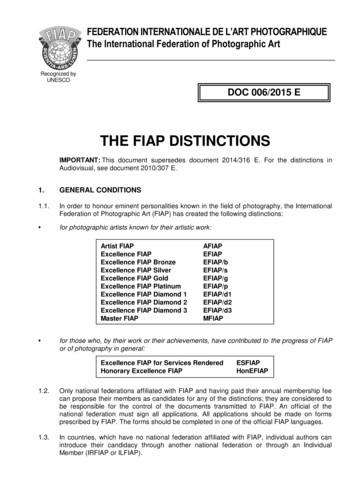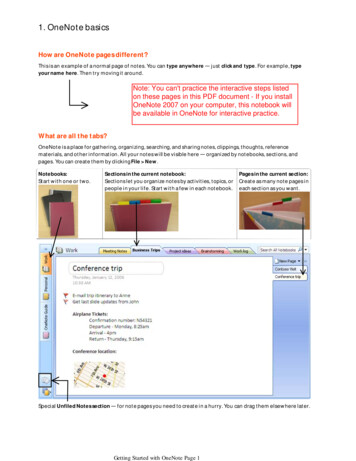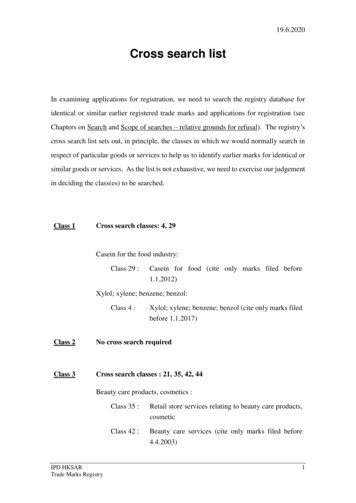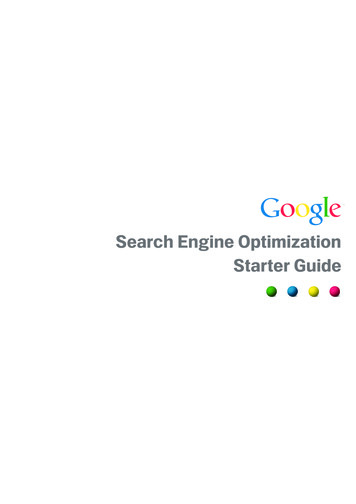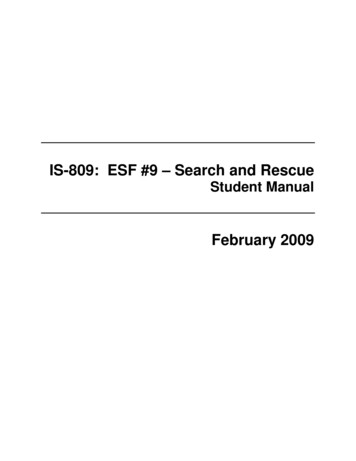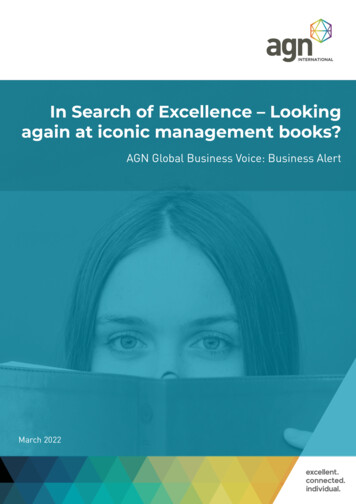
Transcription
In Search of Excellence – Lookingagain at iconic management books?AGN Global Business Voice: Business AlertMarch 2022
Business Alert: In Search of Excellence – Looking again at iconic management books?Business Alert:In Search of Excellence – Looking again aticonic management books?IntroductionIn a wave of publishing that took grip mainly in the 1980s and 90s, ‘management texts’ becamethe must have shelf liner for millions of executives across the world. It was a period when someof the greatest management texts were published. Lauded at the time as ‘breakthrough insights’into how and why the successful companies are so successful. Books in which hero CEOs handeddown pages of wisdom like tablets of stone, to accompany the highly fashionable MBA course booksin which academics articulated cornerstone management theory, and self-help books that gaveendless lists, tips and anecdotes designed to make the reader a millionaire.The Upstart GurusThere are a group of books that sit on more executives’ bookshelves than any others and ensuretheir authors became instant management gurus capable of demanding huge speaker fees on theconference circuit. In Search of Excellence (1982) – Tom Peters. What Tom discovered was that regardless of howdifferent each company was, they shared eight basic principles of management that anyone canuse on their way to success. They are in the book - illustrated by case studies of apparently thebest-run companies in the world – (or at least those with fastest growing stock values). Built to Last (1994) – Jim Collins. Jim says “It is not about visionary product concepts orvisionary products or visionary market insights. Nor is it about just having a corporate vision.This is a book about something far more important, enduring, and substantial. This is a bookabout visionary companies.” The companies profiled have an average life of greater than 100years and are juxtaposed to a more contemporary direct competitor who invariably performedless well. From Good to Great (1996) – Jim Collins. Jim is back with a review of how ‘good’ companies,even mediocre or bad companies, might achieve enduring greatness? Jim investigates ifthere are companies that defy gravity and convert long-term mediocrity or worse into longterm superiority? And if so, what are the universal distinguishing characteristics that cause acompany to go from good to great?
Business Alert: In Search of Excellence – Looking again at iconic management books?These books sold over 10 million copies and it’s widely accepted they contain ’pearls of wisdom’– but some 30 to 40 years on, not all the companies featured have survived or thrived (Kodak forexample!). Critics have also observed that the authors were perhaps too keen to ascribe goodfortune, coincidence and market forces to management whit, guile and wisdom. Did they changethe world or were they just emblematic of the prevailing enthusiasm for unbridled globalisation,commercialism and the hero CEO? A Mckinsey & Co analysis shows that over 20 years, the stock ofthe companies featured in these books out-performed the market by an average of 1.7% - so theremight be something to be learned here!In summary: Fascinatinginsights to corporate strategy –turns out a little over hyped.The Worthy AcademicsOur second group of texts focuses on authors that might be described as pioneering managementtheorists, and books that invariably feature in core MBA and business studies syllabus. They may bedusty, but these books are perennial best sellers. Competitive Strategy (1980) – Michael E Porter. The book presents insights into how tocompete in any given market, but also demonstrates how all players in that market can usetheir competitors’ information to beat them at their own game. Competitive Strategy presents athorough examination of how industry competition works as well as many of the strategies thatsuccessful businesses employ to create advantage and increase market share. Marketing Management (1967) – Philip Kotler. As Philip puts it, this book is about; “the artand science of choosing target markets and getting, keeping, and growing customers throughcreating, delivering, and communicating superior customer value” – eg his iconic definition ofmarketing. It’s the bible of marketing principles and a great reference book and is now on its14th Edition with the latest Pearson version including content from around the world relevant toreaders outside the United States. The Practice of Management (1954) – Peter F Drucker. Drucker has written many famousmanagement books but probably the most famous since its publication in 1954, The Practice ofManagement was at the time the first book to scrutinize management as a discipline and howto be a manager as a stand-alone responsibility. In the Preface, Drucker explains that the aim ofthe book “is to narrow the gap between what can be done and what is being done, between theleaders in management and the average”. It’s an indisputable classic.What we have here is the gold standard of academic texts. They are able to transcend sometimesdated references to old case studies and redundant technologies because their propositions orobservations were seismic or fundamental. These books weren’t written for casual reference butfor earnest study so don’t expect an easy read. They are more suited to the MBA student than thebusy executive – and if you didn’t study these at university perhaps the moment has passed and youmight be better off reading one of the many precis or related articles that are out there.
Business Alert: In Search of Excellence – Looking again at iconic management books?In summary: Not holidayreading, but if you can findtime well worth the effort.The Top TipstersThe third group are the Top Tipsters – management book authors that bottled theory and observationdown to a series of ‘how to’ behaviours that might revolutionise your approach to management. At leastthat’s what they tend to say on the covers of these books! How to win friends and influence people (1936) - Dale Carnegie, Pocket Publishing. An 80 year oldclassic that’s sold more than 30 million copies – making it one of the best-selling books of all time.Dale claims that you can learn the six ways to make people like you, and the twelve ways to winpeople to your way of thinking. It is claimed that Dale’s principles endure, and will help you achieveyour maximum potential in the complex and competitive modern age. If nothing else the enduringpopularity of this book must stand for something. 7 Habits of Highly Effective People (1990) – Stephen Covey, Simon & Schuster. Covey reveals a stageby stage approach for living with integrity, fairness, human dignity and service. Apparently, these arethe principles that give us the confidence to flex with change and the power and wisdom to capitaliseon the opportunities that can be created by the change happening around us. Deeper and moreprofound than the title of the book might suggest. The One Minute Manager (1981) – Kenneth Blanchard and Spencer Johnson, William Morrow &Co. The One Minute Manager has been praised for its universal appeal and for converting esotericmanagement theory into simple, actionable strategies. Amazon put it this way “The blockbusternumber one international bestselling phenomenon is back not that it ever really went away. Thiseasily-read story quickly demonstrates three very practical management techniques: One MinuteGoals, One Minute Praisings and One Minute Reprimands”. Says it all really.Over the years some critical reviews have chided Dale Carnegie for being insincere and manipulative,but the fact is the book has sold more copies than any other book in this article. Generally, these sortof texts are sometimes referred to as “quote books” and even ‘self-help’ books. They’re not the grandvolumes that are ‘required reading’ but are dip in dip out reference books. They suffer the charge ofbeing simplistic and repetitious, banal and unoriginal, merely offering their readers platitudes.and youcan understand that accusation, particularly when held up against the other books listed here.
Business Alert: In Search of Excellence – Looking again at iconic management books?In summary: Don’t expect too muchand you won’t be disappointed.Handy for a presentation quote.The Avant GuardeThe fourth and final group we look at brings us up to date. Has anyone really made an impact in the waythat our earlier authors have? Who are the current authors and are their books worth reading? At thetime of writing (the list is reviewed hourly) Amazon.co.uk list the following as their top 5 ManagementBooks. No1 - Atomic Habits (2018) - James Clear, Penguin. World-renowned habits expert James Clearhas discovered that real personal behavioural change comes from the compound effect of hundredsof small decisions: what he calls atomic habits. James delves into cutting-edge psychology andneuroscience to explain why they matter. Surely just another self-help quote book? But it’s gettingrave reviews and has already sold over 1 million copies. No2 - 12 Rules for Life: An Antidote to Chaos (2019) - Jordan B Peterson, Penguin. A guide to livingproperly in a world of chaos and uncertainty. The NY Times describe Jordan Peterson as “the mostinfluential public intellectual in the Western world right now”. And the New Stateman describe thebook as a “rare thing: self-help that might actually be helpful”. No3 - Chief of staff. Notes from Downing Street (2021) - Gavin Barwell, Atlantic Books London. No4 - Mental Fitness: 15 Rules to Strengthen Your Body and Mind (2021)- Ant Middleton, Harper Collins. No5 - The Mental Toughness Handbook: A Step-By-Step Guide to Facing Life’s Challenges,Managing Negative Emotions, and Overcoming Adversity with Courage and Poise. (2022)- Damon Zahariades, Theartofproductivity.com (independent publisher).These titles were revealed as the best sellers under Amazon, Business, Finance and Law, not mind body& spirit or Health, family and lifestyle and yet four of the top 5 are self-help books that speak to mentalhealth, well-being or managing the daily pressures of a modern world. What does this tell us?Another interesting observation is that all of the authors are regular, influential and well-read bloggers.In some cases, these books are simply an accumulation of previously published materials. But you don’thave to look far and nearly all of the previously mentioned titles begin to appear. ‘How to win friends.’and ‘7 habits.’ are still even today regular top ten features.
Business Alert: In Search of Excellence – Looking again at iconic management books?Have we found excellence?If excellence is about a lasting legacy, bringing structure to a hitherto unstructured world, or indeedpractical and useful behavioural models that can be applied to today’s problems – then the WorthyAcademics win this search hands down.Alternatively, if you’re looking for inspiring stories of past glories then the Upstart Gurus will suffice.Time has taught us to consume some of their revelations with a pinch of salt. With the benefit ofhindsight, it’s been possible to disassemble management genius from simply being in the right place atthe right time.Right now, it would seem that the Top Tipsters and the Avant Garde are almost the same thing. Manymanagement books of recent years have been of the self-help, listing variety. It does seem extraordinarythat 80 years from when it was first published Dale Carnegie’s How to Win Friends and Influence Peopleis regularly competing with the latest bloggers compilation of digital content.And perhaps that notion is worth a second look. Our study here has been centred on print and publishedworks, hard copy, physical literature. Perhaps Carnegie does sell relatively well in this traditionalmedium but maybe the big audiences have moved elsewhere? Online? To the world of bloggingstars and digital content, YouTube and Ted. Could it be we’ve been looking in the wrong place for theexcellence we seek?SourcesArticle - What happened to the world’s “greatest” companies? – Chris Bradley Partner, McKinsey & Co,Sydney, Australia.Article - The Top 50 Best Selling Management Book of all time - Topmanagementdegree.comAmazon.co.uk Top 10 Best SellingThe 10 Best Management Books To Read in 2022 – Rick Kettner. Rickkettner.comCopyright 2022 AGN International Ltd. All rights reserved. No part of this publication may be reproduced, distributed,or transmitted by non-members without prior permission of AGN International Ltd.
For further information, or become involved, please contact:AGN InternationalEmail: info@agn.org Office: 44 (0)20 7971 7373 Web: www.agn.orgAGN International Ltd is a company limited by guarantee registered in England & Wales, number 3132548, registered office: 3 More London Riverside, London,SE1 2RE United Kingdom. AGN International Ltd (and its regional affiliates; together “AGN”) is a not-for-profit worldwide membership association of separate andindependent accounting and advisory businesses. AGN does not provide services to the clients of its members, which are provided by Members alone. AGN and itsMembers are not in partnership together, they are neither agents of nor obligate one another, and they are not responsible or liable for each other’s services, actionsor inactions.Copyright 2022 AGN International Ltd.www.agn.org
Jim says "It is not about visionary product concepts or visionary products or visionary market insights. Nor is it about just having a corporate vision. This is a book about something far more important, enduring, and substantial. This is a book about visionary companies." The companies profiled have an average life of greater than 100
